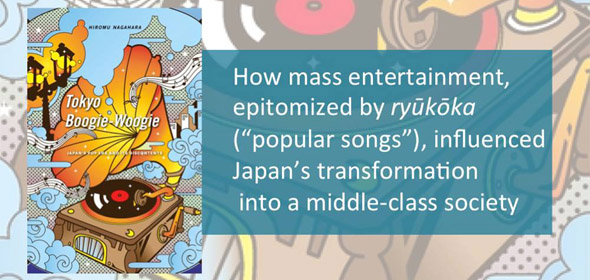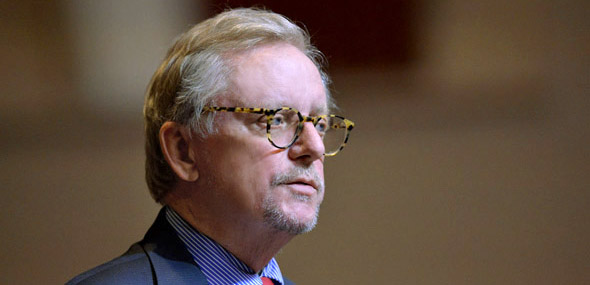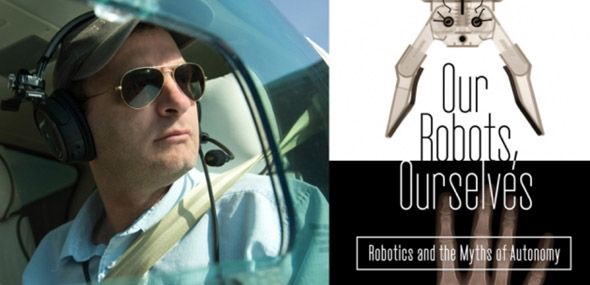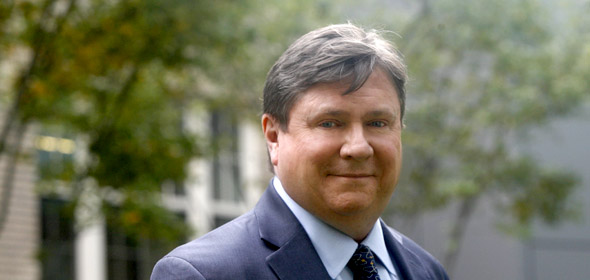Said and Done
May / June 2017
Published by the Office of the Dean
MIT School of Humanities, Arts, and Social Sciences

QUOTABLE
“At this pivotal time in the Middle East, the MIT-Arab World Program seeks to build critical scientific and cultural connections between MIT and the Arabic-speaking world.”
— Philip Khoury, MIT Associate Provost, Ford International Professor of History, and the MIT-Arab World faculty director
RESEARCH
ABDUL LATIF JAMEEL POVERTY ACTION LAB
Experts gather at MIT to improve education technology for disadvantaged learners
Researchers, policymakers, and education company leaders discuss innovative technologies to improve education for disadvantaged learners. Building off the lessons from the conference, J-PAL North America plans to catalyze new research and promote evidence-based policymaking in the education technology space.
Story at MIT News
MENS ET MANUS AMERICA
Mens et Manus America initiative examines the politics of misinformation
At the third event hosted by Mens et Manus America, Professor Adam Berinsky joined Professor Ezra Zuckerman Sivan to share political science and sociological research on the impact of rumors, lies, and fake news on America's political process.
Story by SHASS Communications
HEALTH ECONOMICS
Testing their patients | Amy Finkelstein and Tamar Oostrom
MIT researchers have found that Medicaid recipients are 20 percent more likely to wait more than 20 minutes to begin a scheduled appointment, compared to privately insured patients. “Most of this difference in wait times is explained by the practices and providers Medicaid recipients see,” Oostrom says — but not all.
Story at MIT News
HISTORY
Big in Japan: Tokyo Boogie Woogie | Hiromu Nagahara
Historian’s new book explores the connection between pop music and the transformation of Japanese society. From 1919 through the 1960s, Japan’s pop music industry became a powerhouse. By the time the pop-music boom slowed, in the 1970s, Japan had transformed from a traditional, hierarchical society into a nation where almost everyone describes themselves as middle class.
Story by Peter Dizikes at MIT News
SECURITY STUDIES | CENTER FOR INTERNATIONAL STUDIES
3 Questions: Jeanne Guillemin on the chemical attack in Syria
On April 4, 2017 a suspected nerve gas attack killed at least 80 unarmed civilians in Khan Sheikhun, in Syria’s Idlib Province. Guillemin, a medical anthropologist, authority on biological weapons, and a senior fellow in the SHASS-based Security Studies Program, discusses what is known about the attack, the historical context for chemical attacks, the physical and psychological impact of such weapons, and how to bring those responsible to justice.
Interview by Michelle Nhuch
POLITICAL SCIENCE
An ear for political language
Doctoral student Tom O’Grady maps the rise of anti-welfare rhetoric in decades of speeches in the UK Parliament. This shift in rhetoric was, in part, the result of a steep decline in the number of MPs drawn from the working class. “This was due to institutional change, including the collapse of the trade union movement in the UK, which had historically sponsored the political careers of coal miners and other working class tradespeople,” says O’Grady.
Story by Leda Zimmerman
MIT SHASS RESEARCH
Mapping MIT's humanities, arts, and social science research around the globe
Each point on the map represents one or more projects selected from the School's larger international portfolio. Together, the projects span the breadth of MIT-SHASS disciplines — from anthropologists researching post-Soviet Mongolia to political scientists studying health services in Guatemala, to linguists revolutionizing education in Haiti.
Browse the map
NEWS FEATURE
MISTI | CENTER FOR INTERNATIONAL STUDIES
Building connections between the Institute and the Arab world
Through student projects and faculty collaborations, MISTI's MIT-Arab World Program offers opportunities for immersive, meaningful interaction in the region with the aim to empower participants to be bridges between MIT, the U.S., and the Arab World. The faculty director for the program is Philip Khoury, MIT Associate Provost, and Ford International Professor of History.
Story
"In 2016, The MIT-Arab World Program matched 19 MIT students with teaching and internship placements in Jordan, home of the archaeological city of Petra."
HONORS AND AWARDS
SHASS COMMUNITY
Keller, Daglio, Ludwig, Irvine, and Wang receive 2017 SHASS Infinite Mile Awards
The awards, which salute members of the SHASS staff who have made exceptional contributions to their academic units, the School, and the Institute, were presented at a festive luncheon on May 1. Barbara Keller (Anthropology) received the Inclusion Award; Luis Daglio (Music and Theater Arts), Ana Ludwig (Office of the Dean) and Albert Wang and Daniel Irvine (Office of the Dean) received Unsung Hero Awards.
Visit the 2017 Infinite Mile Gallery
ECONOMICS AND POLITICAL SCIENCE
Acemoglu, Stewart, and Nielsen receive high-profile Carnegie Fellowships
MIT economist Daron Acemoglu and political scientists Richard Nielsen and Charles Stewart III have been named 2017 Andrew Carnegie Fellows, and will receive up to $200,000 each to support a research sabbatical. Acemoglu, Nielsen, and Stewart are each pursuing long-term scholarly projects relating to political institutions, authority, and legitimacy.
Story by Peter Dizikes at MIT News
L to R: Rich Nielsen, Charles Stewart III, and Daron Acemoglu | Photos: Stuart Darsch (Nielsen), Jon Sachs (Stewart), and Allegra Boverman (Acemoglu)
DEVELOPMENT ECONOMICS
Esther Duflo and five other MIT professors elected to the National Academy of Sciences
Duflo is a co-founder and co-director of the Abdul Latif Jameel Poverty Action Lab (J-PAL). In her research, she seeks to understand the economic lives of the poor, with the aim of helping design and evaluate social policies. Her work engages her in issues of health, education, financial inclusion, environment, and governance. In addition to Duflo, Professors Bell, Bhatia, Cummins, Jensen, and Mavalvala were honored for research achievements.
Story at MIT News
SHASS EDUCATORS
2017 SHASS Levitan Teaching Awards announced
Dean Nobles has announced the recipients of the 2017 James A. and Ruth Levitan Awards for Excellence in Teaching. Warmest congratulations to these six educators and colleagues, who represent the very best academic leadership in the School: Claire Conceison, Donca Steriade, William C. Cutter, Hee-Jeong Jeong, Maria Khotimsky, and Jetson Leder-Luis.
More at SHASS News
GLOBAL STUDIES AND LANGUAGES
Catherine Clark receives Mellon Fellowship
Clark, an Assistant Professor of French Studies and Class of 1947 Career Development Professor in the Global Studies and Languages section, has received a Mellon Fellowship for 2017–2018 from the School of Historical Studies at the Institute for Advanced Studies. At the IAS, Clark will work on a book about the French fascination with the People's Republic of China after 1949.
Story at SHASS News
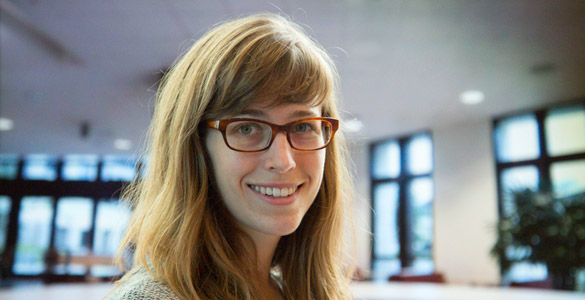
Catherine Clark, Assistant Professor of French Studies and Class of 1947 Career Development Professor, Global Studies and Languages
WRITING
Anita Desai receives 2017 Blue Metropolis International Literary Grand Prix
Desai, author and Professor Emerita of Humanities at MIT received the award at a ceremony on April 29, in Montreal. This prize is awarded each year to a world renowned author in recognition of a lifetime of literary achievement.
Story
POLITICAL SCIENCE
David Singer receives an inaugural MIT Change Maker Award
Singer, Associate Professor of Political Science, and Associate Head of MacGregor House, received the award for his work chairing the Presidential Committee on Sexual Misconduct Prevention and Response. Singer spearheaded the effort to ensure all faculty and staff receive training on sexual misconduct prevention as well as how to respond to a student who discloses a sexual misconduct incident.
Story at MIT News
THE HUMAN FACTOR SERIES
The political, cultural, economic dimensions of major global issues
3Q with political theorist John Tirman
"It is remarkable that we do not measure the costs of war in any meaningful way. The costs come in many shapes and sizes: mortality and disability, loss of livelihoods and homes, displacement, the destruction of clean water resources and sanitation facilities, the disruption of education for children, ecological devastation, and many others. All wars produce these results, yet no country, including the U.S., has the will to understand and calculate these costs."
Interview by SHASS Communications
"The academy rewards burrowing down rather than cultivating across fields of inquiry. Everyone knows this is a liability, and yet few have tried to remedy this narrowness. To counter this tendency, one might take MIT’s great strength — problem-solving — and purposefully tackle problems (as MIT has done with energy) that must involve many different disciplines."
— John Tirman, Executive Director, MIT Center for International Studies
NEWS
SCIENCE, TECHNOLOGY, AND SOCIETY
Knight Science Journalism program at MIT announces 2017-18 class of fellows
Ten elite science journalists from four countries will be part of the program's 35th class. KSJ fellows pursue an academic year of independent study, augmented seminars, master classes, and workshops. The program fosters professional growth among the world’s community of science journalists and encourages them to pursue their mission, first and foremost, in the public interest.
Meet the 2017-18 Fellows | Photos + Bios
COMPARATIVE MEDIA STUDIES
The Spiciest Memelord | Podcast Interview with MIT's Jeopardy Champ Lilly Chin
In early 2017, Lilly Chin won the Jeopardy College Championship. The MIT senior and Comparative Media Studies minor took home a check for 100K, and with her Final Jeopardy response, earned a spot in the same internet lore she studied. In this interview, Whitacre talks with Chin her experience on Jeopardy, and of sudden fame in a digital world.
Interview by Andrew Whitacre for CMS/W
CSAIL + CENTER FOR INTERNATIONAL STUDIES
Technology and national security expert, R. David Edelman, joins MIT
Edelman comes to MIT after serving in the White House and distinguishing himself as one of the U.S. government's foremost voices on how technology is changing our economy, national security, and daily lives. Edelman is directing the Project on Technology, the Economy, and National Security, holding a joint appointment with the Computer Science & Artificial Intelligence Lab, and the SHASS-based Center for International Studies.
Announcement at CIS | Story in The Washington Post
SHASS COMMUNITY
Writing for a Wider Audience
Faculty from across the Institute participated in this lively, illuminating event on April 25, 2017, at which six distinguished publishing professionals discussed ways to shape academic scholarship into general literature. The event was sponsored by the Office of the Dean, MIT School of Humanities, Arts, and Social Sciences, and Kneerim & Williams, a literary agency with offices in Boston and New York. Couldn't attend? Here's the video!
Video: Shaping Academic Scholarship into General Literature
DE FLOREZ FUND FOR HUMOR
The Online Humor Conversation Series at MIT launches
Led by MIT PhD student Jonny Sun, the new series brings online comedians together with academics to discuss humor's impact and influence on the internet, society, and culture. The project is funded by the MIT-SHASS De Florez Fund for Humor. Spring events are forthcoming on May 11, 15, and 18.
Series Website | About the De Florez Fund for Humor
THE HUMAN FACTOR SERIES
The political, cultural, economic dimensions of major global issues
SCIENCE, TECHNOLOGY, AND SOCIETY
David Mindell on the human dimensions of technological innovation
“The new success of robots will depend on how well they situate into human environments; as in chess, the strongest players are often the combinations of human and machine. I increasingly see that the three critical elements are people, robots, and infrastructure — all interdependent."
Interview by SHASS Communications
“The new frontier is learning how to design the relationships between people, robots, and infrastructure. We need new sensors, new software, new ways of architecting systems.”
— David Mindell, Dibner Professor of the History of Engineering and Manufacturing, and Professor of Aeronautics and Astronautics
IN THE MEDIA
ECONOMICS
Escaping Poverty Requires 20 Years Plus | Peter Temin
In his new book The Vanishing Middle Class: Prejudice and Power in a Dual Economy, economist Peter Temin shows how the United States has split along economic lines into a two groups with vastly differing realities.
Story at the Atlantic | Story at Forbes | Story at The New York Times
SCIENCE, TECHNOLOGY, AND SOCIETY
Stepping away from tech | Sherry Turkle
Amidst a movement to step back from constant phone use, Professor Turkle describes how mobile devices can affect in-person communication, even when turned off or silent.
Transcript at CNN
SCIENCE, TECHNOLOGY, AND SOCIETY
March for Science is a "pretty unprecedented" defense of scientific truth itself | David Kaiser
MIT SHASS science historian David Kaiser puts the recent Science March in perspective, saying that although protesters’ concerns are not entirely new, the movement on the part of “many scientists and other citizens” is unusual in that it involves a ”sweeping defense of scientific truth itself."
Story at The Washington Post
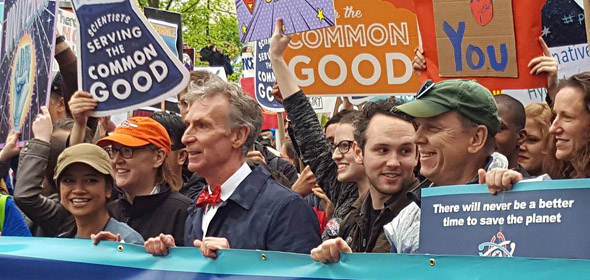
Bill Nye leads demonstrators on a march to the U.S. Capitol during the March for Science in Washington, U.S., April 22, 2017. (Photo, Becker1999, Flickr)
“David Kaiser, a historian of science at MIT noted that "taking to the streets in a sweeping defense of scientific truth itself and its role in policymaking" is broader and more fundamental than previous public demonstrations about science.
KNIGHT SCIENCE JOURNALISM AT MIT
What a year with a single tree reveals about climate change
"The tree first came into my life along with John O'Keefe, a biologist who for the past 25 years had studied the same 50 trees at the Harvard Forest, less than two hours west of Boston. I was a Knight Fellow in science journalism at MIT in 2013–2014, sitting in with professor Andrew Richardson's lab at Harvard University."
Story at The Boston Globe
MUSIC AND THEATER ARTS
The neurology of romantic love
MIT’s Catalyst Collaborative and Underground Railway Theater bring to life two characters who seek to explain the neurological basis of romantic love.
Story at WBUR | Story at The Boston Globe
COMPARATIVE MEDIA STUDIES
Real-time chatting with live streamers | T.L. Taylor
Even when comments cost money, chatters are willing to pay. “Live streamers are adept at connecting with the folks watching them, drawing them out and into the play experience,” Professor Taylor has found.
Story in The New York Times
POLITICAL SCIENCE
Playing the Russia Card in Syria | Carol Saletz
Carol Saletz of the MIT Security Studies Program discusses what it might take for the President to work with Vladimir Putin on a plan for peace in Syria.
Story on NECN | Video on WGBH “Greater Boston”
Dr. Jim Walsh is a Senior Research Associate at the MIT SHASS Security Studies Program. Dr. Walsh's research and writings focus on international security, and in particular, topics involving nuclear weapons, the Middle East, and East Asia. Walsh testifies before the United States Senate and House of Representatives on issues of nuclear terrorism, Iran, and North Korea, and offers regular media commentary on foreign policy matters. He is one of a handful of Americans who has traveled to both Iran and North Korea for talks with officials about nuclear issues.
Jim Walsh's MIT webpage | Media Presentations
Will U.S. try to denuclearize North Korea by force? | Jim Walsh
Walsh comments on the U.S. rerouting of war ships toward the western Pacific following North Korea’s firing a ballistic missile into the Sea of Japan.
Video commentary on Al Jazeera News
Pence warns North Korea but open to negotiations | Jim Walsh
Walsh comments on the U.S. policy toward North Korea, citing recent U.S. attacks on Syria and Afghanistan.
Video on CBS News | Related CBS story
Expectations of North Korea threat | Jim Walsh
Walsh, Senior Research Associate in the MIT SHASS Security Studies Program, explains how the current U.S. presence in South Korea and Japan may mean that conflict with North Korea is at hand.
Transcript at CNN
Secretary of State Tillerson seeks unified front on Syria | Jim Walsh
MIT SHASS Senior Research Associate Jim Walsh talks with NPR about the air strikes on Syria and Tillerson’s attempt to convince Russia to distance itself from the Syrian administration.
Story at WBUR
HEALTH CARE ECONOMICS
Using tax reforms to help the economy | Jonathan Gruber
Ford Professor of Economics Jonathan Gruber tells Molly Boignon of Boston Public Radio about some new ideas for tax reforms.
Full show on BPR
HEALTH CARE ECONOMICS
Tax plan would benefit “the very richest” | Jonathan Gruber
After the administration released its tax plan, many critics noted the proposed cuts favor wealthy individuals and corporations. Economist, Jonathan Gruber analyzed specifics.
Story and audio on WGBH
ECONOMICS
How the rise of the robots will affect the future of jobs | David Autor
It’s a good time to have specialized skills and a tough time to have “ordinary “skills, says MIT economist David Autor. According to Autor, “Computers robots, and other digital technologies are acquiring [traditional workers’] skills and abilities at an extraordinary rate.”
Story at CNBC | Story at CBS News
ECONOMICS
Most workers have held off the machines | David Autor and Brendan Price
Jobs with very routine tasks have declined in the U.S., according to a paper by economists David Autor and Brendan Price, entitled “The Changing Task Composition of the U.S. Labor Market.”
Story at Bloomberg
STAY IN TOUCH
Follow us
SHASS stories on MIT News
Bookmark this page
Publications Directory
Portal to all MIT SHASS publications
MIT Campaign for a Better World
Story | Join Us
Said and Done is published by the Office of the Dean
MIT School of Humanities, Arts, and Social Sciences
Editor and Designer: Emily Hiestand, Director, SHASS Communications
Publication Associate: Sarah Goodman, SHASS Communications
May 10, 2017
About the MIT School of Humanities, Arts, and Social Sciences
Making a better world — Generating solutions for the great challenges of our age requires both advanced technical and scientific knowledge and a deep understanding of the world's human complexities. MIT-SHASS researches and advances the cultural, political, and economic dimensions of innovation — the broad range of human realities, from deeply-felt cultural traditions to building codes to political tensions, in which science and technology issues are embedded.
Excellence — In 2017, MIT's Social Science disciplines were ranked first in the world, and MIT's Humanities and Arts disciplines were ranked among the top three worldwide.
Research with a global impact — The MIT-SHASS research portfolio is vast, including anthropology, comparative media studies, economics, history, international studies, languages, linguistics, literature, music and theater arts, political science, philosophy, security studies, and writing, including science writing.
Education that empowers — The School teaches every MIT undergraduate, empowering students with cultural and historical perspectives, and critical thinking and communication skills — to help them serve the world wisely and well. The School's seven graduate programs are all recognized as among the finest in the world.
Cultivating leaders — SHASS has a central role in international education at MIT, and in preparing students for leadership at home and on international teams. Through all their SHASS coursework, and in MISTI, the School's pioneering applied international education program, MIT students learn how to work, collaborate, and thrive in cultures around the globe.
